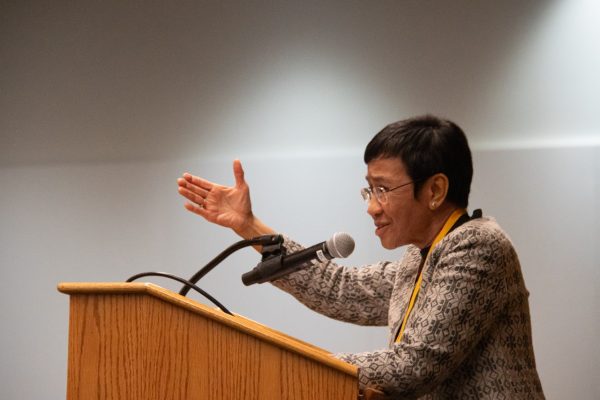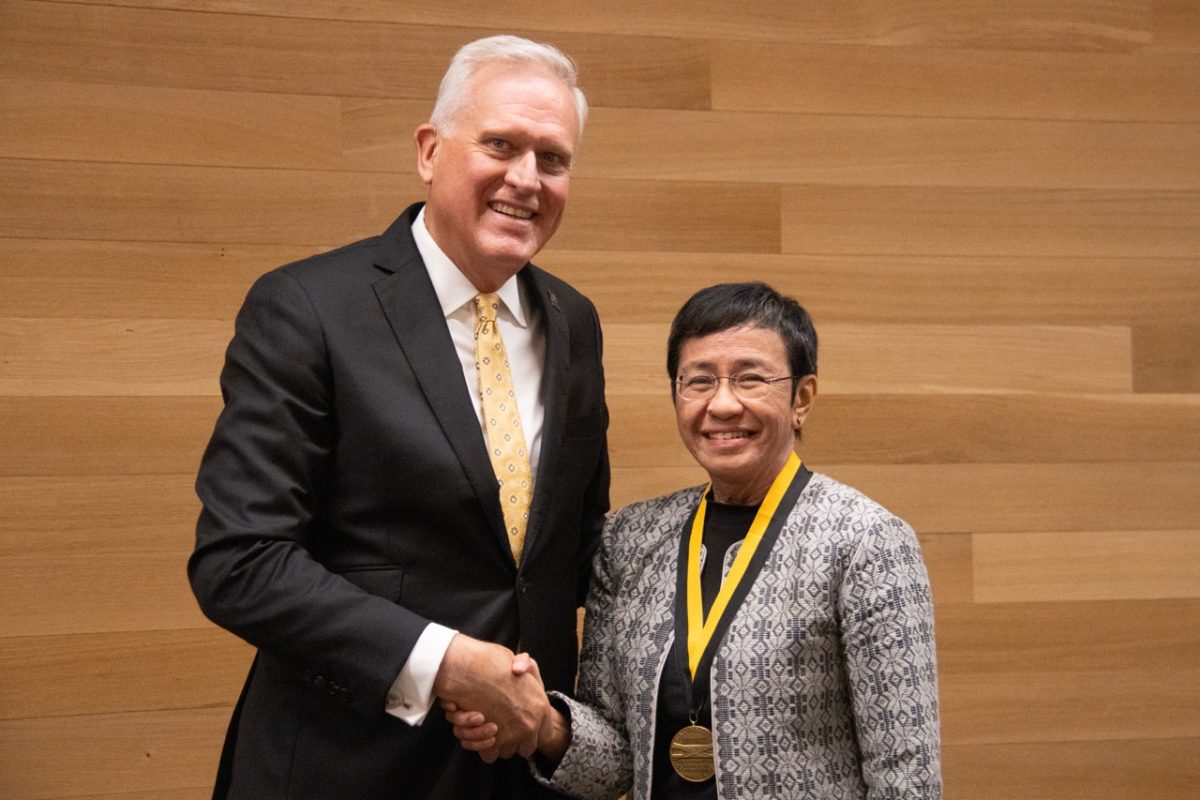Filipino American journalism legend and Nobel Peace Prize winner Maria Ressa spent time connecting with members of Columbia’s Filipino community at a meet-and-greet on Sept. 30. Ressa was visiting the University of Missouri to receive the 2025 Missouri Honor Medal for Distinguished Service.
At 10:30 a.m., Mizzou students, faculty and community members gathered in the Reynolds Journalism Institute Palmer Room, chatting excitedly in a mix of Tagalog and English as they awaited Ressa’s arrival. Moments before, Ressa had finished speaking at a panel with Knight Press Freedom fellow Gustavo Gorriti and fellow medalist Jorge Ramos about the future of journalism in democracy.
Joseph Avanzado, a Missouri School of Journalism graduate academic advisor, organized Ressa’s meet-and-greet as an opportunity for individuals, particularly Filipino community members and youth, to interact with Ressa in a more casual setting.
“The first time I heard that she [was] coming, I just thought of reaching out to my community here,” Avanzado said. “We have to do something because it’s not every day that you have a Nobel Peace Prize winner coming to visit, and she’s Filipino,” Avanzado said.
Among the handful of community groups Avanzado contacted was the Mizzou Filipino Student Association, of which Mizzou junior Shah Zadehahmad Sabzi is a member. Sabzi, who is Iranian , resonated with Ressa’s work in exposing government corruption.
For Sabzi, corruption is a problem in Iran just as it is in the Philippines, with Iranian people being jailed or killed for protesting issues such as internet blackouts.
“Because of that, many people [in Iran] don’t speak out about the issues there,” Sabzi said. “So I want to learn more about [Ressa’s] fight to, like, keep going, and the news website that she co-founded in the Philippines and all of the challenges that came with that.”
Ressa is the founder and CEO of Rappler, a leading digital news outlet in the Philippines. Rappler conducted relentless watchdog reporting to expose corruption in the Philippine government, primarily during the administration of President Rodrigo Duterte. As a result, Ressa and her team became the targets of harassment, hate and mockery by online syndicates designed to promote pro-Duterte propaganda and silence trustworthy news outlets on social media.
The team also faced a series of 23 legal cases designed to silence their reporting, including a cyber-libel conviction against Ressa and Rappler researcher Reynaldo Santos Jr., which is currently under appeal before the Philippine Supreme Court.
In 2021, Ressa was awarded the Nobel Peace Prize for her leadership in protecting democracy and press freedom across the globe. The Mizzou School of Journalism recognized her continued dedication to this mission by naming her one of this year’s Missouri Honor Medal recipients.
Avanzado’s aim in organizing the meet-and-greet was to extend Filipino hospitality to Ressa, and to show that the Filipino community in Columbia stands in solidarity with her and her efforts.
“That’s our initial thought, just to make her feel welcome coming here and just letting her know that we have a Filipino community here supporting her work and all that,” Avanzado said. “I think it’s just the right thing to do.”
All eyes turned to Ressa as she was escorted by Avanzado into the Palmer Room, where she greeted her eager audience with a friendly smile. Her soft-spoken, bubbly countenance put the room at ease, creating an intimate environment where the attendees could interact with her at a more personal level.

Ressa asked for each of the 12 community members gathered to introduce themselves to her. She leaned in close when the attendees spoke, listened eagerly, pressed for details about their lives in Columbia and demonstrated genuine, meaningful interest in each individual’s story.
As a reporter, Ressa deeply values her personal connections and networks of family and friends.
“What made Rappler work was a coalition of the old and the young, literally,” Ressa said. “I think that’s the secret. That isn’t so hard. It is all about the communities you create. It’s as much listening as it is doing the journalism.”
She has championed the formation of “communities of action” to fight against the spread of online disinformation and hate. While she was head of the news division at ABS-CBN, the largest media conglomerate in the Philippines, she called on the community to take democracy into their own hands by organizing a series of citizen journalism campaigns under the name Boto Mo, I-Patrol Mo, which translates to Patrol Your Vote.
The rallying cry of the 2009 Boto Mo, I-Patrol Mo campaign was Ako ang Simula, which roughly translates to “I am the beginning.” When asked how Mizzou journalism students could apply this motto of social activism in their own lives, she advised them to understand themselves first, and to hold themselves to the ethics and standards of journalism.
“So the first is, you know, know who you are, know why you’re doing what you’re doing,” Ressa said. “This is hard. It’s really hard. I think I saidI didn’t really know it until I was in my 30s because you have to also give yourself time to explore and social media is unforgiving.”
She went on to warn students about disinformation and manipulation online, and reminded them to maintain autonomy over their own minds and be open to experimentation.
“So look at the world today with clear eyes and then form a news organization for the times,” Ressa said. “I think that’s our challenge.”
Finally, she encouraged young journalists to invent new strategies for defending the truth.
“It’s a time of both destruction and creation — literally creative destruction,” Ressa said. “So as individual journalists, take the old standards and ethics, reformulate it and form your new coalitions.”
After photos had been taken with Ressa and the meet-and-greet concluded, Ava Grace Cordero, a first-year in broadcast journalism, expressed her excitement over the encounter with such a prominent Filipino, or Pinoy, journalist.
“It’s definitely so nice to hear from a Pinoy perspective, especially in the journalism field,” Cordero said. “I feel like in the journalism field, there’s not a lot of Filipino journalists or reporters, so it’s definitely refreshing to see that and especially someone that I’ve looked up to.”
Avanzado also shared his enthusiasm for the community building the meet and greet facilitated. Some of the attendees had friends who worked with Ressa in the Philippines, and for Avanzado, being able to bond with Ressa over those mutual connections was a surreal experience.
Theresa Solis Metz, the director of recruitment and college engagement in the College of Education and Human Development at Mizzou, was one Filipino faculty member who attended the event. She said that Ressa’s presence was important because it showed Ressa’s persistence and continued dedication to her work, even in the face of legal and social adversity in the Philippines.
“Was [Ressa] here and doing seemingly well? For the most part, yes,” Metz said. “So is that a potential of motivation and inspiration and encouragement for us to continue seeking truth and speaking truth for the average person? Certainly.”
Ressa’s presence at the event made a lasting impression, demonstrating the impact journalists can have by listening to the stories of individuals and offering advice to youth within the communities they seek to protect.


